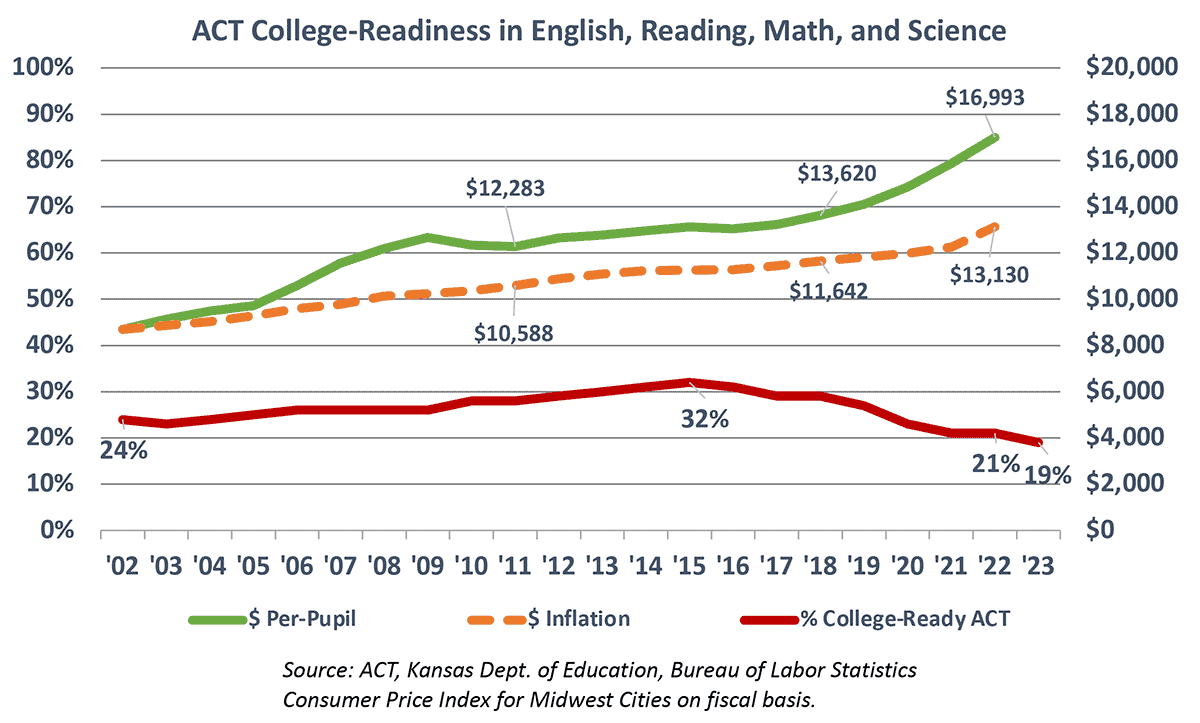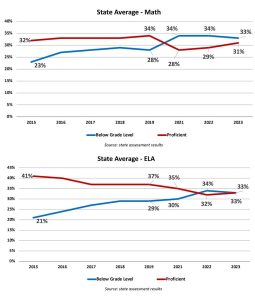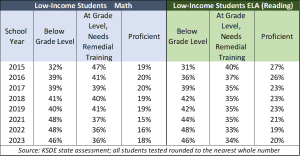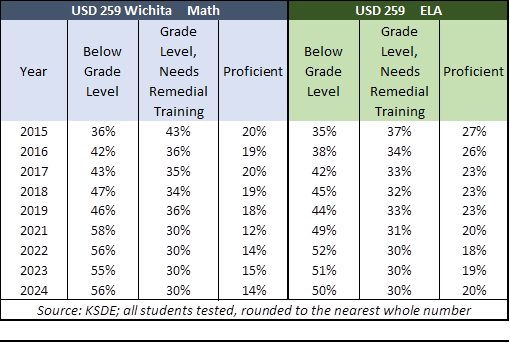The Kansas Department of Education introduced its current gimmick – “Kansans Can” – in 2016 with great fanfare. Instead of an academic focus, KSDE and State Board of Education decided to put the emphasis on so-called soft skills to be developed through social emotional learning (SEL). Soft skills are good, but we learned those in the old days as part of our academic training (show up on time, be prepared, turn in your homework, teamwork, problem solving, etc.).
“Kansans Can” promised a lofty vision that “Kansas leads the world in the success of each student.”
However, the 2023 student achievement outcomes show KSDE should toss “Kansans Can” in the can and force school districts to get back to academic basics.
Kansas hit another new low on the 2023 ACT results, with a composite score of 19.4 (down from a previous low of 19.9) and only 19% of graduates college ready in English, Reading, Math, and Science. Outcomes have steadily declined since the 2015 peak of 32% college ready and a 21.9 composite. Spending per student has meanwhile grown much faster than inflation is expected to be well above $17,000 when final results for 2023 are released.

State assessment results reflect a similar slide since the “Kansans Can” gimmick was implemented.

In Math, 32% were proficient in 2015 and 23% were below grade level. The proficiency level moved up a point by 2019, but the percentage below grade level shot up to 28%, resulting in a net decline. Now 33% are below grade level and only 31% are proficient.
The slide in English Language Arts is even more precipitous. Proficiency fell from 41% in 2015 to just 33% now, while the percentage of students below grade level jumped from 21% to 33%.
The 2023 outcomes are just slightly better than last year, and KSDE is predictably ignoring reality. Commissioner Randy Watson actually told State School Board members they should “dance around the capitol” to celebrate. A small improvement is nice, but outcomes were declining pre-COVID and still are not back to 2019 levels.
Students from low-income families have been especially hard hit by the “Kansans Can” debacle. Almost half are now below grade level in both subjects and only one in five is proficient. The Legislature gave school districts $3.8 billion in at-risk funding since 2015 to help kids who are academically or economically at risk, but two state audits have determined that school districts are not using to the money to provide them with ‘above and beyond’ services as required by state law.

Education officials refusing to follow the law on at-risk funding (and also the building needs assessment law) is appalling but not surprising. That would require the adults in administration to change their behaviors, but that won’t happen until the Legislature compels them to do so with meaningful consequences, like loss of accreditation and education savings accounts for students in districts that won’t comply with state laws.
KSDE officials will likely defend “Kansans Can” with claims of insufficient special education funding and COVID interference rather than admit their effort hasn’t produced the promised outcomes. These are the same officials who pretend that proficient is a made-up term and that no students are below grade level on the state assessment.
Legislators must now decide whether to impose consequences or accept the fact that many students won’t get the education they need to succeed in life.
The unions, the state school board association, and most administrators will howl, and they will step up efforts to remove student-focused legislators from office. Sadly, that matters more to some elected officials. But those who are truly there to stand for students and their parents must unequivocally say ‘enough’ and compel education officials to do their jobs and follow the law.






